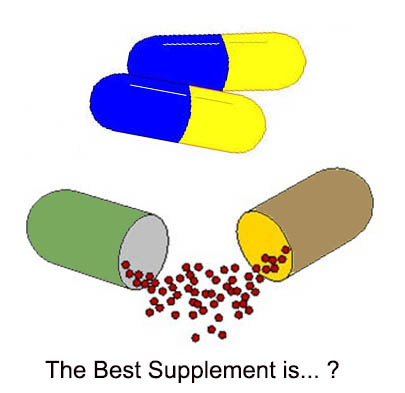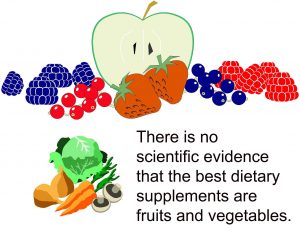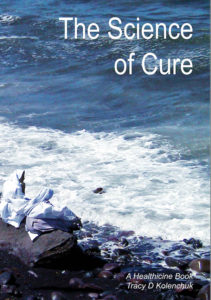 If you want to know which supplements are best, there are two independent researchers in the English language world. If you know of another, please tell me. Both publish their methodology, how they evaluate products, and update their methodology on a regular basis. They don’t reference or quote each other, because they are selling “information about multivitamins”. They are in competition.
If you want to know which supplements are best, there are two independent researchers in the English language world. If you know of another, please tell me. Both publish their methodology, how they evaluate products, and update their methodology on a regular basis. They don’t reference or quote each other, because they are selling “information about multivitamins”. They are in competition.
There is no medical science of supplements, only a science of products. There is no medical science of healthiness, only of illness. How can we find out which supplements are healthiest?
NutriSearch Corporation publishes The NutriSearch Comparative Guide to Nutritional Supplements. This is a Canadian organization – in Canada you might find the guide, or a previous edition, at your local library. I recommend scrolling down on their webpage and watching the video for more information. NutriSearch does NOT sell vitamins. They sell a book that lists evaluations of over 1000 products.
The Multivitamin Guide lists their top 100 on their website. Their top 11 products get a score of 8 of 10 or higher. You can fill out a quick survey on their website to get a recommendation from them. The Multivitamin Guide provides links to purchase multivitamins. I assume that’s their ‘income’. They have incentive to promote specific products, which they market. They have incentive to ignore products they do not market.
I believe NutriSearch does a better job of evaluation, and evaluates more products. NutriSearch evaluates products in 18 dimensions (in the edition I have) and updates the scores as new scientific research is published. They make money from their recommendations, not from sales. The price of the NutriSearch book is less than one month’s supply of the highest rated supplements.
Both agree on the score for some products, with minor variations. They use different scoring systems, NutriSearch scores from 1 to 5, on 11 dimensions, and MultiVitamin Guide scores from 1 to 10, on four dimensions. But, you can multiply the Nutrisearch score by 2 you get a comparison MultiVitamin score. I believe score difference of one point on a scale of 1 to 10 is negligible – a difference of more than one point is more significant.
I don’t have the latest NutriSearch guide, I’ve ordered it to provide up to date comparisons. However, I do have the Fourth Edition. Manufacturers are also constantly updating products, product names, and marketing information, in competition with each other. I can provide a few comparisons of similar products. 
The products in green have scores within 1.2 of each other. Products in orange significantly different ratings. MultiVitamin Guide reviews a single product for each manufacturer, so you might mistakenly purchase a different product, because they choose a different product in the same line by mistake. MultiVitaminGuide reviews only supplement by Douglas Products, whereas the NutriSearch guide provides ratings for 26 different products from Douglas Products, with scores ranging from 1 to 10. I chose only highest one for comparison with the MultiVitamin Guide selection.
Disclosure: I take one of the products on the green section, every day, at half the recommended amount.
The Science of Supplements
Most supplements, and all highly rated supplements contain far more than just vitamins. There is little ‘science’ of supplement products. Most scientific studies of specific vitamins and minerals are done in isolation. Supplements are designed to improve healthiness, when there is no diagnosable disease. But, there are no scientific journals of health, only of disease.
No medical journal will accept research about ‘health’. All require research into and reference to disease for publication consideration. No medical journal in existence today will consider for publication, any research from either of these companies (or any other) about healthiness of supplements. They only accept research into diseases.
There is also no science supporting statements that supplements are bad for your health. There is scientific research demonstrating that individual vitamins are useful to fight illness, but this research is usually based on one specific vitamin at a time, not on combinations of vitamins, minerals and other plant nutrients. Multivitamins are complicated. Supplements are more complicated. Health is complex.
The majority of supplement research is done to measure effects of multivitamins on signs and symptoms of disease X. After all, that’s what the medical journals will publish. Pick a specific product, generally an inexpensive low end product, and run a scientific study against a specific disease – a disease considered to be ‘incurable’. If the disease was considered to be curable, there would be no need for a supplement. This results in a research paper saying “multivitamins don’t help (signs and symptoms of) incurable disease X”. Note: Modern medicine views most diseases as incurable.
The press doesn’t bother to study research papers, they just print “multivitamins are worthless”.
You might think, that if we are actually interested in producing powerful health supplements, we would test the best products, and compare them to each other. But, there is no interest. Research efforts are simplistic studies of individual products, do not build on each other, and do not work towards any science of supplements nor of healthiness. The press makes them less useful, in an effort to create a story from something of little or no importance.
Which is Healthiest?
Imagine a scientific study that took 1000 healthy people and measured their healthiness. Then divided the group in half, and gave one-half the top rated supplement by the MultiVitamin Guide, and the other half the top supplement according to the NutriSearch score. Then, after three months, they measured the subjects healthiness again. That would be a worthwhile study. The value of supplements would have a useful answer, or at least a starting point.
Imagine a second step, studying the people in the study to determine which supplements were best for which people.
But, there’s a huge technical problem. We have exactly zero tools to measure healthiness. Our entire medical system measures illness and indicators of illness, but not healthiness. We can measure strength in many dimensions – but those are not measures of healthiness. Measuring healthiness is hard, and we’ve had no practice at all.
The only companies that study drugs in clinical studies are the companies that sell them. Drugs are patented, and other researchers are often legally prohibited from studying them. They are also often technically prohibited, because the drugs are not yet available for purchase. This, frankly, is not science, it’s commerce, using unscientific research (dressed up in a tuxedo) to promote unscientific behavior. True scientists compete to share what they have accomplished.
Corporations do medical research for ‘products’, fund universities to study products, to get approval for products, to market products. Every medicine you can buy has a marketing team, often a bigger marketing team than most multivitamin corporations. There is, today, no such thing as medial research that is not product driven and product biased. Products make money. Products make money off of sick people. Healthy people? There’s no money in them.
The only companies that study high end supplements are the companies that sell them. Contrary to drugs, I suspect these companies would be very happy to be used in research studies measuring healthiness. But, there is no interest. There’s no money in studying someone else’s product unless you can produce a negative result. Pepsi beats coke, consistently, in Pepsi’s scientific research studies, by design.
Today, all medical research is biased, by design. Drug companies sponsor studies of supplements only to produce negative results. They don’t sell high quality supplements, they compete with them.
As a result, the medical establishment has nothing positive, not even anything official to say about supplements, or the work done by NutriSearch and MultiVitamin Guide. Doctors are free to give advice, and every doctor is on their own with regards to forming their opinions. Doctors within the ‘conventional medicine’ paradigm are discouraged from recommending supplements, although there is no evidence to support this position. Many doctors do not agree, but few speak out privately and fewer speak out publicly, except those actively involved in marketing specific products.
Doctors who believe supplements can provide benefits, cannot find unbiased research. There is no unbiased research, and no research at all that is supported by the medical establishment. Doctors can only find a product they believe in, make recommendations, and observe individual results.
Positive results from individual doctors are ‘anecdotal evidence’ and theoretically considered unacceptable as scientific data. This theory nonsense when we consider that every cure is an anecdote, not a clinical study, that every clinical study is actually a collection of anecdotes. In addition, the majority of clinical studies are not designed to study cures, and by design, cannot recognize cures when they occur.
Which are Supplements Safest?
Drugs are unnatural poisons, by design. A drug cannot be patented if it is ‘natural’. Drugs act by fighting illness, and often act by fighting healthiness. Drugs usually ‘work’ by pushing health out of balance in specific dimensions, to fight the effects of illness – that push health out of balance in other directions. Drugs are sold by prescription, because they are dangerous. Drugs have side effects, and every drug lists side effects or possible adverse consequences of a standard dose, on the label or packaging – usually in very, very small print. Drugs are dangerous. We know this to be true.
Water is also dangerous. You can drown in it. If you drink too much, or too little, you might get sick or die. But water is essential to healthiness. Clean, healthy water, in the right amounts – and living entities have wide tolerances for water consumption.
When we compare supplements to drugs, and expect similar risk measurements and levels, we’re thinking nonsense. When a reporter, or a marketer, or a competitor, tries to argue that supplements are dangerous, they are creating nonsense. Low value supplements are worth little, but you might choke on the big pills. High quality supplements are safer than pizza, swimming pools, crossing the street, or driving in a car. Which supplements are safest? Supplement your diet with fruits and vegetables. Which are most dangerous? Stop supplementing your diet with desserts.
 Asking which supplements are safest, is like asking “which apples are safest?”. Yes apples can be dangerous in specific situations. They might be rotten. They might be covered in pesticides. But apples are eaten to improve healthiness, not illness.
Asking which supplements are safest, is like asking “which apples are safest?”. Yes apples can be dangerous in specific situations. They might be rotten. They might be covered in pesticides. But apples are eaten to improve healthiness, not illness.
Are high quality supplements safer than fruits and vegetables? People die every year from eating fruits and vegetables. But of course people eat lots of fruits and vegetables every day. Risk is not measured just in injuries or deaths.
Both NutriSearch and MultiVitamin Guide evaluate the production quality and safety of the products they review, but this information is of little value – even less if you choose a high value product. Safety research that is essential in a “drug paradigm”, is of low value in a supplement evaluation.
Are Supplements Improving?
Do high value supplements improve as the years go by, due to healthy competition? Do they improve in value for your dollars? Because there is no science of healthiness, we have no way to measure the benefits and risks of any dietary supplement, except with reference to disease. We don’t know if highly rated products have improved, or not, or improved in some dimensions, and not in others. Lower quality products have little incentive to improve, because they are generally replaced by ‘new’ products next design cycle. Marketing of low quality products is primarily based on newness, or fashion, not on quality.
High quality products are constantly working, trying to improve their status against their competitors. But without any science of supplementation, we have no science, no knowledge.
But take note. We don’t study the healthiness of potatoes, or apples, or eggs either. You might see 5 different kinds of eggs for sale in your local supermarket. Which one is healthier? There is no science.
Supplement Bashing…
Supplement bashing and multivitamin bashing is commonplace. Many people are stuck in the paradigms of illness and disease, and thus ignorant of health. I call this ‘medical chauvinism’. Medical chauvinists advise that there is no such thing as a “good multivitamin”. This is simply propaganda, like saying “all trees are bad” or like saying there are no “good apples”, because apples don’t cure any disease. Duh….
Supplement bashing arguments are not supported by any definition of good, or bad, or health, except with reference to disease. There is no science that actually measures the goodness, or the badness, of supplements.
At the same time as supplements are presented as ‘bad’ or ‘worthless’ medical authorities and marketers include supplements in many foods to prevent disease or to enhance marketability. It’s a clear case of do what I say, not what I do..
Officially, according to the US/FDA, supplements must be labelled “the product is not intended to ‘diagnose, treat, cure or prevent any disease,’ because only a drug can legally make such a claim.” It’s simplistic nonsense. An apple a day cannot, according to the US/FDA prevent any disease ‘legally’. The suggestion that only a drug can claim to ‘diagnose’ any disease is ridiculous. Officially, only doctors can diagnose disease. But at the US/FDA, nonsense is the law.
Form your Own Opinions
How might we know what multivitamins are good? There is no science. If you are not sick, your doctor is not qualified to make a recommendation. Who is qualified? No one but you.
You’re on your own – as it should be with regards to health, because there are no experts on health.
to your health, tracy
Founder: Healthicine


